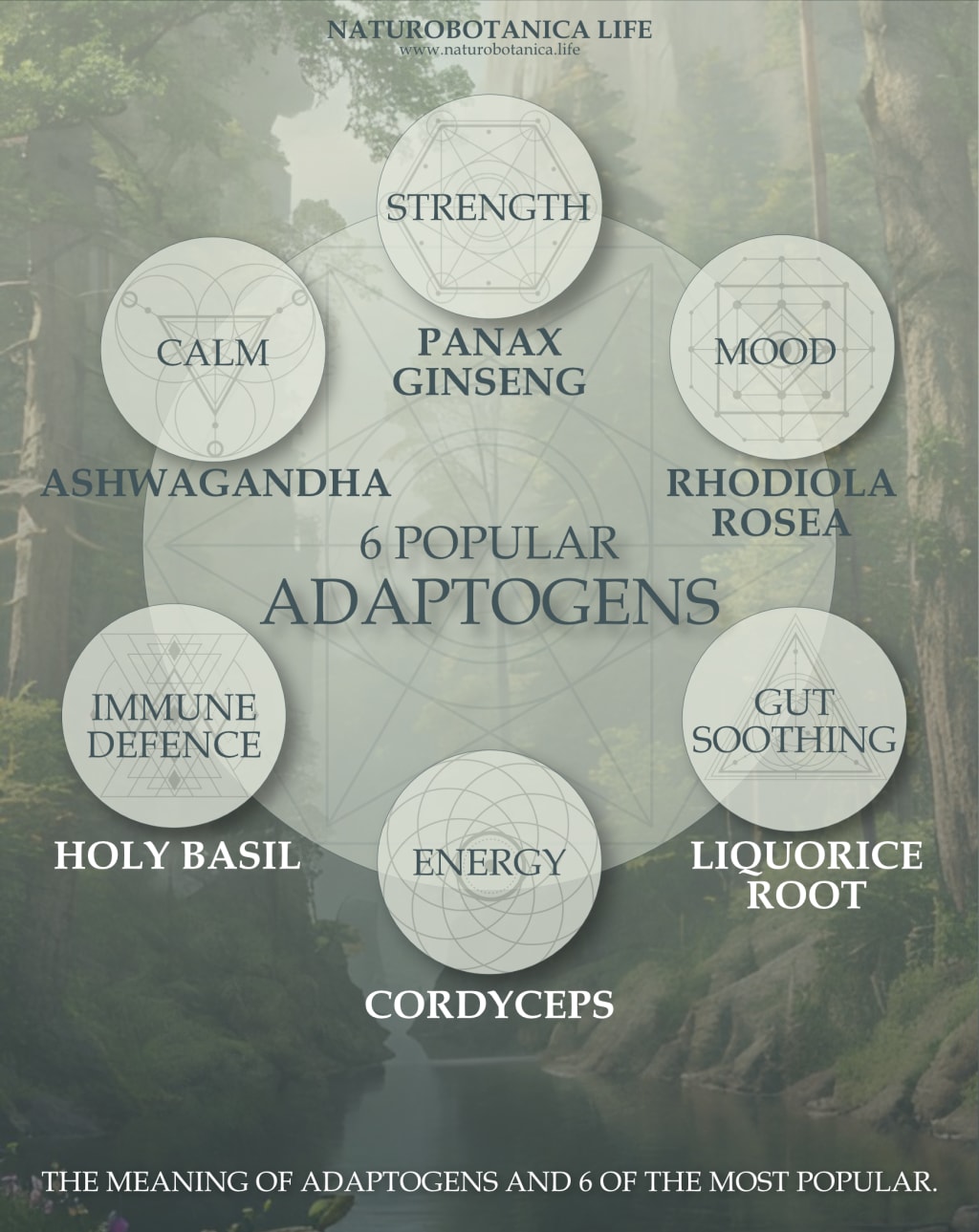The Meaning of Adaptogens and 6 of the Most Popular.
The meaning of adaptogens describes the ability to adapt to our bodies needs by balance, restoration, and protection.

Adaptogens are naturally occurring substances, which include specific herbs and plants, and have deep roots in traditional medicine and have been used for centuries. Adaptogens are becoming popular of late with common knowledge of ginseng and medicinal mushrooms. This article explores the concept of adaptogens and spotlights six of the most popular ones.
What Are Adaptogens?
Adaptogens comprise of plants & fungi that support the body in terms of ‘stress’ be it physical, chemical, or biological. History shows that adaptogens were used in Ayurvedic and traditional Chinese medicine. The concept of adaptogens was formally introduced in 1947 by the Russian scientist N.V. Lazarev, who described them as agents that enhance the body’s “state of non-specific resistance” in times of stress.
These substances function by regulating the adrenal glands’ production and release of stress hormones. They aim to stabilize the hypothalamic, pituitary, and adrenal axes, the trio involved in stress responses. By supporting adrenal function, adaptogens can support fatigue and anxiety.
A list of the Six Most Popular Adaptogens
- Panax Ginseng
- Ashwagandha
- Rhodiola Rosea
- Holy Basil
- Liquorice Root
- Cordyceps
1. Panax Ginseng
Panax ginseng, often called Asian ginseng or Korean ginseng, has antioxidant and anti-inflammatory properties. It is widely used to enhance cognitive function, physical endurance, immune system health, and diabetic conditions. Best known for its ability to elevate energy levels and reduce exhaustion, as well as to improve mental clarity and physical stamina.
Il Hwa Korean ginseng extract use only high quality Korean ginseng as its raw material. Il Hwa Korean ginseng is a condensed form of pure liquid, extracted from high quality ginseng roots through a low temperature vacuum method. This unique method preserves the original efficacy of the ginseng itself. It is delicious both in hot or cold water.
2. Ashwagandha
Ashwagandha, or Withania somnifera, has been used in Ayurvedic medicine, for its rejuvenating effects. It’s frequently used to alleviate stress, anxiety, and fatigue, bolstering overall immune function and improving sleep quality, strength, and endurance.
3. Rhodiola Rosea
Found in the cold parts of Europe and Asia, a Viking nutrient, Rhodiola Rosea is used to boost energy, stamina, strength, and mental capacity. This herb aids the body in adapting to and resisting various stressors, including physical, chemical, and environmental.
4. Holy Basil
Known also as Tulsi, Holy Basil has been used in Ayurveda for its healing properties. It aids in fighting infections, lowering blood sugar and cholesterol, easing joint pain, and safeguarding the stomach. As a potent antioxidant, Holy Basil also facilitates the body’s detoxification from pollutants.
5. Liquorice Root
Liquorice Root is distinguished by its therapeutic effects, particularly in supporting the digestive system and respiratory conditions. This adaptogen helps soothe and restore balance to the stomach’s acid production, and reduce inflammation. Liquorice Root is also used to relieve stress and support adrenal gland functions by modulating the body’s cortisol levels.
Pure Encapsulations DGL Plus features deglycyrrhizinated licorice (DGL) root extract. Provides 300 mg of DGL in each vegetarian capsule. With aloe inner leaf extract, slippery elm and marshmallow.
6. Cordyceps
Derived from a type of fungus that lives on caterpillars in China’s high mountain regions, Cordyceps are known to support athletic performance and reduce fatigue. They have been used to boost libido and sexual function, alongside providing a significant energy uplift.
Conclusion
Adaptogens support the body’s ability to cope with stress and improving overall health. From Panax ginseng’s energy-boosting properties to Ashwagandha’s calming effects, they offer a broad spectrum of health benefits.
References
1. Panossian, A., & Wikman, G. (2010). Effects of Adaptogens on the Central Nervous System and the Molecular Mechanisms Associated with Their Stress—Protective Activity. Pharmaceuticals.
2. Singh, N., Bhalla, M., de Jager, P., & Gilca, M. (2011). An overview on ashwagandha: A Rasayana (rejuvenator) of Ayurveda. African Journal of Traditional, Complementary and Alternative Medicines.
4. Cordyceps as a Herbal Drug. Herbal Medicine: Biomolecular and Clinical Aspects.
About the Creator
Christina Boon mANP mGNC
Christina is a Registered Nutritional Therapist & Director of Naturobotanica based in the Uk & specialising in Vitamins & supplements
Enjoyed the story? Support the Creator.
Subscribe for free to receive all their stories in your feed. You could also pledge your support or give them a one-off tip, letting them know you appreciate their work.






Comments
There are no comments for this story
Be the first to respond and start the conversation.